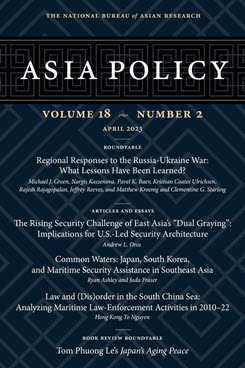Article in Asia Policy 18.2
Law and (Dis)order in the South China Sea
Analyzing Maritime Law-Enforcement Activities in 2010–22
This article assesses the role of maritime law-enforcement (MLE) vessels in an apparent trend of heightened competition in the South China Sea and identifies patterns in the maritime policing by MLE vessels of the disputing South China Sea claimants during unplanned encounters at sea.
EXECUTIVE SUMMARY
MAIN ARGUMENT
The South China Sea disputes, involving six political entities—China, Taiwan, Vietnam, Malaysia, Brunei, and the Philippines—have been a political flashpoint in Southeast Asia since the 1970s. The emergence and growing prominence of civilian MLE vessels (conventionally known as marine police or coast guard vessels) suggests that disputants are taking new measures to assert their claims without overtly militarizing them. Maritime policing has increased in frequency and intensity in the past decade. Yet, when considering four factors—the use of forcible measures, physical damage, human injuries/casualties, and diplomatic protests—an analysis of publicly reported naval incidents in the South China Sea between 2010 and 2022 suggests that conflict escalation primarily happens at sea between the crews. Such incidents, which range from single-day events to months-long confrontations, have, in the worst cases, resulted in intense diplomatic standoffs lasting longer than two months. In general, however, disputants have refrained from taking hostile political or legal actions against harassment at sea.
POLICY IMPLICATIONS
- Given that reducing misunderstanding and mitigating the risks of physical confrontations is of benefit to all the South China Sea disputants, ongoing talks for a code of conduct for the sea should include a proper legal framework for MLE operations. This framework—to be separate from the existing Code for Unplanned Encounters at Sea, which only applies to naval vessels—should stipulate the threat and/or use of force at sea by MLE vessels because coast guard enforcement duties may require different levels of force.
- Disputants should re-establish and refocus talks to address joint fisheries and marine resource management in disputed waters. They would also benefit from reinforcing the regional hotline for maritime emergencies and setting up a crisis management hotline at the coast guard level.
- Regional MLE agencies should increase communications both onshore and offshore and hold joint exercises and exchanges that would increase mutual understanding and trust, which would subsequently help prevent unexpected consequences.
Hong Kong To Nguyen is a PhD student and MEXT scholar in International Relations at Ritsumeikan Asia Pacific University (Japan). She was a WSD-Handa Fellow at the Pacific Forum in 2022. Ms. Nguyen received a BA in philosophy and political science from Columbia University and an MSc in international relations from Ritsumeikan Asia Pacific University.
About Asia Policy
Asia Policy is a peer-reviewed scholarly journal presenting policy-relevant academic research on the Asia-Pacific that draws clear and concise conclusions useful to today’s policymakers. Asia Policy is published quarterly in January, April, July, and October and accepts submissions on a rolling basis. Learn more


